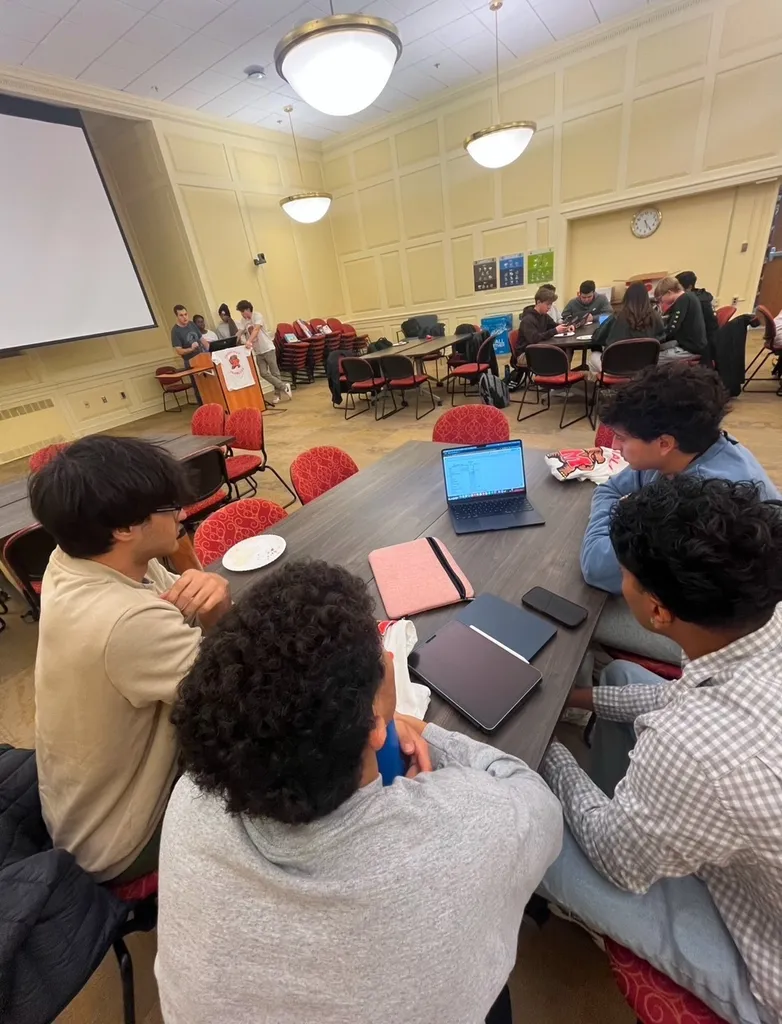- April 03, 2025
- By Karen Shih ’09
Nobody ever said that scrutinizing a spreadsheet is a rollicking good time. But as a group of students shouted out numbers, Mad Libs-style—$90,000 salary! Three roommates! $12,000 in investments!—they discovered that with the help of a peer mentor (and some formulas to automate calculations), figuring out a monthly spending plan and saving for a hypothetical college grad isn’t so bad.
“Financial literacy is power,” said Gage Hamilton ’27, a finance major who co-led the exercise during a "Fearlessly Budgeting" event for “Financial Peer Mentoring” (BMGT299A) and who started investing as a high schooler. “I want to be able to teach others so they feel in control of their own financial health. That leads to more confidence and a lot less stress.”
The class is part of the University of Maryland’s new Financial Wellness Center, which aims to educate students about everything from budgeting to insurance and investing. The peer mentor model deepens understanding for those imparting the lessons and brings financial tips to a wider audience, one of the many ways UMD is innovating in learning and teaching.
“I’m a big fan of meeting students where they are,” said Robert H. Smith School of Business Associate Dean of Undergraduate Programs Joe Bailey, who leads the course that’s open to all majors. “If they’re more comfortable talking to another students about classes to take or where to live, why not have a conversation about managing their money?”

They have frank conversations in class about their own situations, such as whether their parents are paying for college or if they’re working or taking out loans themselves, and discuss other financial struggles, such as one student sharing how they still had to make payments on their car after it got totaled.
The center is co-directed by Smith School Associate Clinical Professor Michael McMillan and Lecturer Sam Handwerger and builds on existing resources at UMD. These include TerpTax, where Handwerger and student volunteers help low-income and international community members file taxes, as well as classes on personal and family finance in the School of Public Health and stock investing in the College of Behavioral and Social Sciences.
“We’re harnessing all the passion so many people have around financial literacy and centralizing it,” said McMillan, who teaches two popular personal finance classes. “This is not just a business school project—this belongs to the whole university.”
Toward the end of the semester, he and Handwerger are planning a “Senior Send-off Week” series of fireside chats on Zoom to prepare the Class of 2025 for the real world. Topics will include tenant and landlord rights, student loan repayment options and credit cards. UMD's new Financial Wellness Coordinator Lakeyla Whitaker will help collect all of that information for its website, creating a repository of resources.
Support for the center’s work comes in part from Maryland’s State Employees Credit Union (SECU), which is also hosting events at McKeldin in April, including Ledo gift card giveaways for answering financial trivia questions such as “What’s the average savings account rate?” (Hint: It’s way lower than 5%, which is a popular guess).
“We know that financial education content can be a bit boring, but SECU is hoping to have fun and give students a wake-up call around what they know and don’t know,” said Annie Weinschenk, who oversees SECU’s university partnerships. “This important topic will be a part of their life as a student and a professional.”
In the fall, the center’s work will start in earnest, once University Libraries installs two additional privacy pods on the first floor for peer mentoring sessions. Having McKeldin as a main hub for the center is a natural fit with the division’s goal of improving students’ information literacy across topics, said Libraries Senior Associate Dean Gary White, who has worked on financial education for years with Business Librarian Lily Griner, a member of the center’s advisory committee.
Freshmen will get tips and workshops during orientation and Fall Welcome, as the center seeks to reach students as early as possible to start good habits.
“This is the time for students to take ownership over their financial future,” said Bailey. “There are a lot of people who might say they’re too busy, or they want someone else to think about it. But if you find yourself in a difficult situation, like if your car breaks down or your laptop is stolen, people who are better prepared can pivot and adjust.”
All through April, Maryland Today will celebrate how the University of Maryland is reimagining learning and teaching. Find more stories at today.umd.edu/topic/we-reimagine-learning.
The new Financial Literacy Center is kicking off a series of workshops at McKeldin Library in April, National Financial Literacy Month:
BMGT399A students’ peer trainer presentations (Special Events Room 6137)
- April 16, 3:30-4:45 p.m.: Budgeting as a Student
- April 23, 3:30-4:45 p.m.: Budgeting for Life After College
- April 30, 3:30-4:45 p.m.: Investing as a Student
- May 7, 3:30-4-4:45 p.m.: Investing for Retirement
SECU Money Month Events: Improve Your Financial Wellness and Get Free Stuff
- April 15, 12-2 p.m. (First Floor): Test your money IQ to win great free prizes.
- April 22, 4-6 p.m. (Special Events Room 6137): Think you’re a budgeting master? Participate in a year-long simulation with the SECU Fin Smart App.
- April 29, 4-6 p.m. (Portico Room): Get your picture taken at the money photo booth and learn more about financial wellness.
Topics
Campus & Community